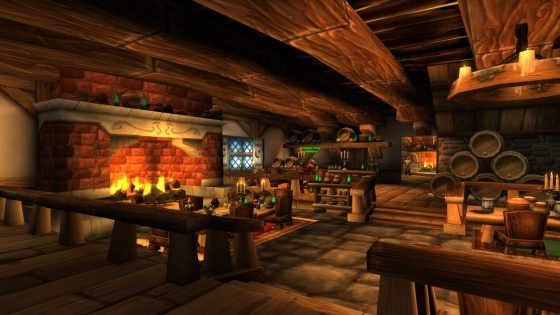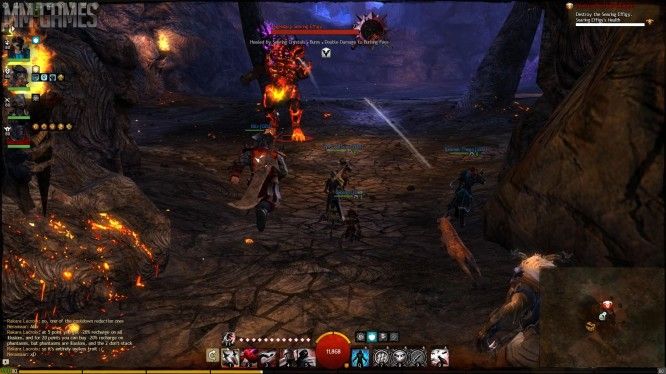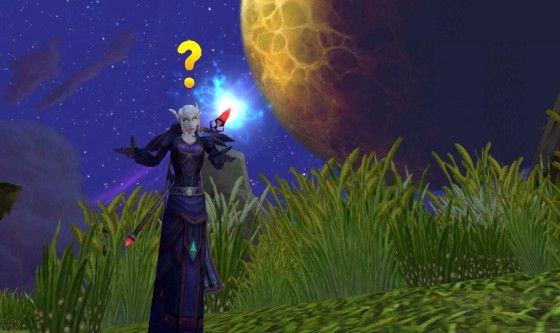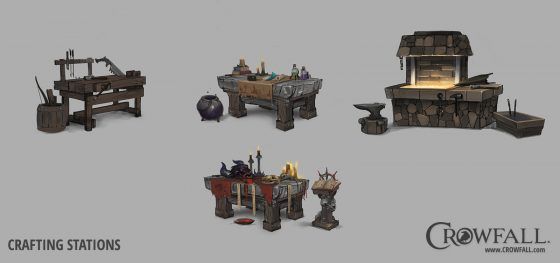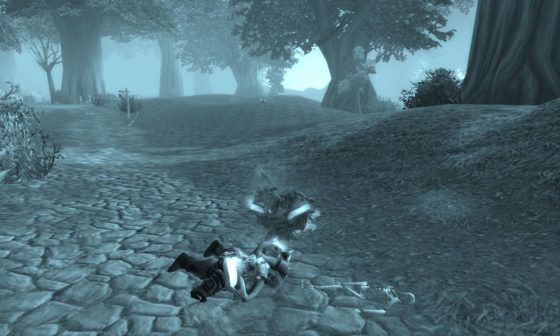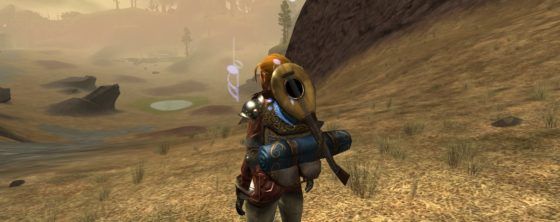If you happen to stumble upon any forum or discussion board related to MMOs, it’s likely that you’ll find a wide array of players unhappy with one aspect or another. Since the introduction of World of Warcraft, the way that MMOs are looked at by both players and developers has changed drastically. There was a paradigm shift from studios venturing into new territory, and trying to be creative, to understanding the potential cash value of the genre. Furthermore, as the genre evolved, players were given access to new, exciting gameplay mechanics.
However, as more pressure has been put on developers to recreate the success of the most popular MMORPGs of old, there have been a number of implementations that have degraded the genre over the last decade. The problem with current MMO design is a massive concept to tackle, and everyone has their own opinions, but I’d like to discuss some fundamental flaws in current generation MMO design. This also doesn’t mean that a game with or without any of these aspects would necessarily be good or bad. These are simply tools that developers tend to include that can hinder or enhance a gameplay experience, depending on how they are used.
Convenience Tools
Some of the most immersion-breaking mechanics that exist in MMOs come in the form of convenience tools. I’m talking about dungeon finders, battlegrounds, cross-realm matchmaking, and the auction house to name a few. A large portion of the MMORPG population exists simply to form groups and build a community. Players like to meet friends, go on adventures, and take on challenging content.
However, it becomes increasingly difficult to forge a community when it’s more convenient not to. Those who played older MMORPGS, and other community-based online multiplayer games, will remember a time when players had to actively search for a dungeon party. Generally, there were hubs where adventurers hung out, and eventually players would become familiar enough with each other to have a long list of friends to immediately invite to a group. It definitely took a lot longer to form groups at first, but it almost always paid off in the quality of people you found or groups at least learned who they did and didn’t want to bring along.
I completely understand the desire for a dungeon finder. There are a lot of casual players out there who can only sit down for an hour or two at most during the day. Sometimes it takes that long to find a party, and it’s much more time efficient to press a button, make a snack and wait for the game to find a party for you. Unfortunately, those experiences are also shallow. After the dungeon finder was created, players no longer had names: they were “healer,” “DPS,” or “Tank.” Nothing matters anymore besides the job they queued to perform. It’s even worse for games that allow cross-realm instancing because you’ll never see those players again on your server. Not only does this hinder friendship building, but it also encourages players to be callous to each other because there's no repercussion based on the way you treat someone.
Where the dungeon finder damaged the community, auction houses have hurt in-game economies. Before the auction house, there were players and entire guilds dedicated to buying and selling goods. If I needed to buy coal in RuneScape, I knew exactly who to contact and about how much I could bargain with them. Of course, like with the dungeon finder, it also took time. Time to spam trade chat inside the city, time to learn who the legit sellers and the scammers were, and time to find anyone willing to buy your latest haul of loot. But it was so much more rewarding being able to interact with the community and learn about your fellow players.
There are games that have applied the auction house system in better ways to still maintain some semblance of community. EVE Online is a great example. Every major station has its own market. That way crafters and wholesalers can still be individually known throughout the galaxy, but players don’t have to wait for them to be online to make a transaction. It’s also more secure and doesn’t require any awkward trade window usage. There are other MMOs with similar systems, such as the guild stores in The Elder Scrolls Online.
Therefore, it really comes down to finding a balance between conveniences and keeping immersion intact. I believe that it’s completely possible to get the best of both worlds, but it’s different for every game and not an easy environment to create.
World Design, Instanced Zones and Questing
An MMORPG should include a wide-open world for players to interact with one another that isn’t segregated by instance portals or channels. Having everyone living in the same world is simply the best design for an MMO, and I don’t believe many people would argue this point at the fundamental level.
Where general arguments do come about are in the forms of convenience (again) and design constraints. One of the biggest reasons that multiple servers and channels exist in an MMO is to avoid crowded zones. It used to be due to technical limitations, but with the movement towards megaservers that will become even less of an issue as time goes on. Additionally, the trend towards action combat is requiring smaller, instanced zones that can hopefully be overcome by more powerful technology and faster internet connections.
Beyond that, there are only a few reasons why players would ever want multiple channels in a single zone. This would be to avoid overcrowding in key farming spots, or questing locations, and to minimize the risk of being ganked while on a PvP server. The second issue is a little more difficult to deal with and mostly relies on the type of game that’s being played. If you picked a PvP server then being ganked just comes along with the territory, and if that game only has PvP servers then it’s up to each player to decide whether or not that game is for them.
The first problem has a number of conceptually simple fixes but all are difficult to implement. This leads into the next two sub-topics: world design and questing. Currently, MMO worlds are simply too small with too much wasted space. There are quite a few MMORPGs out there with massive worlds including: EverQuest, Lineage 2, World of Warcraft, and Lord of the Rings Online. Despite how large these games might feel while playing them, most only take a few hours to run from one end to the other, which is shortened extensively by the use of mounts.
In order to create a truly immersive feeling environment, world size needs to be expanded greatly. I'm talking 5 to 10 times the size of the largest MMO worlds currently available. This would increase the size enough so that thousands, or possibly tens of thousands, of players would have no problem questing, grinding, or farming simultaneously.
Of course, this would also lead to a lot of problems if the same quest and world design systems were maintained. Generally, most major MMOs follow an incredibly linear questing process that has players following a pre-determined route from level 1 to max. The exceptions to this rule would be sandbox MMOs and games that use scaling technology. Now, scaling technology is definitely one solution to this problem, but it also creates a lot of other issues that I’ll touch on later.
Another option would be to have multiple hubs throughout the game where monster difficulty increases the farther away you travel; right outside a city would be level 1 rats while there are level 99 dragons on top of the most distant mountain range. Although this sounds similar to current game design, players would be able to travel any direction from a major city and constantly find more difficult enemies. With a large enough world, this would prevent players from clumping up in low level zones while still providing enough farming ground for high-level groups.
In order to prevent this from becoming a grinding simulator, dynamic events and quests similar to those from Guild Wars 2 could be scattered across the land. This would remove the monotonous quest hub mechanic and promote players to explore the world and help NPCs they find along the way. To be honest, I find the questing system in Guild Wars 2 to be fantastic, with the exception of the linear, instanced zones. Without the design constraints of quest hubs, players would be encouraged to group up and help fellow players out while not having to worry about being on the same quest chain.
Play ‘Your’ Way
The idea that everyone should be able to play an MMO (to end game) whatever way they want is terrible. That doesn’t mean I disagree with options. In fact, I believe that PvE, PvP, and crafting should be interconnected to create a truly immersive game.
Crafters should be able to provide PvE players with their necessary supplies for endgame content, while those players sell the equipment they find from dungeons, raids or world bosses to the PvPers. That creates a symbiotic relationship between all types of players that makes everyone’s role meaningful.
What I really mean is that not everyone should be allowed to have the same fulfillment no matter how they want to play. For example, someone who does nothing but solo PvE content shouldn’t have access to the same content that high-end raiders or the top PvP guilds do. When you allow everyone to be the same, it discourages players from excelling at what they do best.
Furthermore, there will always be some type of imbalance. For example, let’s look at Guild Wars 2. Pre-expansion there was a general mindset that no matter how you played the game, you could eventually access everything. And that was true for the most part. However, that made almost all the content mechanically trivial and didn’t encourage anyone to excel at specific parts of the game. Dungeons were ran once and then basically forgotten because they didn’t provide a meaningful incentive.
Once Heart of Thorns was released, many of these problems were rectified. There were raids for challenging large-group content, and players had access to competitive PvP with seasons. There were even challenges placed throughout the zones that required players to work together to complete. Instead of allowing players to do everything by themselves, the game now encourages players to interact with each other.
Instead of allowing players access to all endgame content regardless of how they play, games need to reward each type of play in a different way. There also can’t be one way that’s more rewarding and more efficient than all of the others. World of Warcraft constantly falls into this trap. Whether it’s raiding or PvP, one way has always provided access to the best gear in the game and that’s a flawed design choice.
Endgame should have a variety of group and solo dungeons, raids, PvP content, and solo PvE content that is rewarding in different ways. Clearly, this is incredibly difficult to balance but it’s necessary to keep a healthy, happy player population. If a player really loves grinding high level mobs then there should be a small chance at them getting an awesome epic item, and high level PvP players should also be rewarded for their effort. Not everything has to be rewarding in the form of a gear treadmill, but it should be meaningful in one way or another.
Content Scaling
This isn’t a new concept by any means, but scaling is starting to become more prevalent in mainstream MMORPGs. The idea of scaling a player’s level to the content of a specific area has existed at least since the mentoring system in EverQuest 2. Being able to lower your character level in order to play with friends or to relive old content is an awesome idea. There are a number of games that do this really well, including Guild Wars 2.
However, potential problems start to arise when a game scales all content to your level. If you make all content equal to your character’s level for the entirety of the game then there’s no sense of progression. Either all content for the rest of the leveling experience is either easy or hard. Physically seeing your character get stronger helps build immersion and an attachment to that character.
There are periods where monsters are really difficult and then times when a character can easily destroy anything in a specific zone. Such disparity gives players the choice to progress into more difficult zones or hang back and level up on easy fodder. Instead, if enemies are scaled and a character always does a similar damage percentage with their attacks for the entirety of the leveling process, it creates a really boring experience.
Imagine playing Gran Turismo on Career Mode and every CPU racer has the exact car. Every time you buy a new car or install an upgrade the CPU also receives an upgrade or a better car. It doesn’t matter if their cars are better or worse than yours, a lack of variety would lead to a dull gaming experience. That same concept works with scaling content in many MMORPGs.
Death Penalty
There should be a fear of death while playing MMORPGs, and that rarely exists anymore. I don’t necessarily mean full-loot PvP, but there should be a moderate death penalty for failing to save your character’s life.
Unfortunately, ideas regarding meaningful death penalties are rather varied and it's nearly impossible to get everyone to agree. However, when players are willing to kill their characters for convenience, such as fast traveling, a game is doing something wrong. The core concept of the MMORPG is the role-playing aspect. That doesn't mean every player needs to full on "role-play," but there should an emphasis on character development and attachment. If you let characters die in a single-player RPG sometimes they stay dead forever, and other times you simply lose the game and have to start over. However, in MMORPGs the death mechanics are often so trivial that they're abused, such as corpse running to bypass certain areas of the game.
If characters feel like an investment, the game itself will matter more to the players. Death penalties can come in two forms: permanent and temporary. Permanent would be ideas like currency/experience loss or dropping items on death, and each of these can vary in severity. A temporary penalty could be similar to the system in Guild Wars where players become weaker until they can improve morale. Additionally, if players are afraid of dying then they're likely to play more careful and form groups, which would expand the need for active communities.
Free-to-Play
While this is a business decision, as opposed to a game mechanic, the free-to-play model can be absolutely soul crushing. It’s almost impossible to design a great game around a free-to-play business model because they’re inherently unfair. They work with limited success in other genres, such as MOBAs, because those games don’t cost nearly as much to maintain and people are willing to spend a moderate amount of money on cosmetic items or boosters that usually don’t directly affect gameplay.
In MMOs, however, there is almost always a negative, pay-to-win, connotation that comes along with free-to-play. It’s incredibly rare to find a game in this category that doesn’t sell some form of power or in-game currency in exchange for real money. With that comes balance issues and all kinds of other problems that eventually lead to a massive decline in population.
Free-to-play exists on the concept that a few paying players will support the rest of the community. A large portion of the game population won’t spend anything at all. Some will spend a little here and there, but a majority of a game’s income will come from the top 1 percent of spenders. This top percent will sometimes spend thousands of dollars on a single game at a time. In order to keep these “whales” enticed, game studios often cater to them, which in turn keeps cash flowing.
This makes buy-to-play and subscription-based MMOs a much better deal for the average consumer. Unfortunately, it limits the player size to those who can afford the base game and/or a monthly fee, but overall it helps create a much higher-quality community.
Class Diversity
The final topic is class diversity. As MMORPGs have evolved, the class structure has degraded into a homogeneous mess. The first few true MMORPGs had a wide variety of roles; some had strict classes while others allowed for complete player customization. There were roles such as DPS, buffer, debuffer, healer, tank, and often balanced classes that weren’t necessarily great at anything specific.
Since then, there have been two types of games that have emerged. The first is the “Holy Trinity,” which consists of DPS, Tank, and Healer. Non-healer support classes are essentially gone. Damage dealers also act as debuffers while healers fill the entirety of the support role, and tanks often have a combination of every aspect.
On its own, the Holy Trinity isn’t necessarily a bad thing. Removing a class archetype or two makes finding all the necessary players for a group much quicker. It also makes balancing endgame content a lot easier. However, in addition to removing roles, there has been a shift to let every class fill every role. There are still a handful of classes around that can only DPS, but there are a lot of healers that can DPS, Tanks that can heal, and some classes that can do all three.
This has essentially removed the need for player interdependence outside of forced group content (dungeons and raids). Players no longer fill niche roles and are no longer special; there’s no reason for a tank to look for a questing partner when they can simply switch to DPS. The perceived desire to solo all content has led to a watered down experience for everyone. Focusing on specific roles makes individuals important and creates a more connected game community.
The other type is the MMO where every class fills literally every role at the same time, or there are no roles and only different forms of DPS. These are games like Black Desert Online, Blade & Soul, and Guild Wars 2 (pre-expansion). This often leads to incredibly limited group experiences that can discourage players who enjoy support roles.
Obviously, there is a need for variety in the types of games available. There should be games with class structures like Ultima Online, World of Warcraft, EverQuest, and Guild Wars 2. The problem is when every game starts to look like one or two of these and players don’t get a choice to fill the roles they want.
Concluding Thoughts Regarding MMO Design
Each of these topics discusses a fundamental way in which MMORPGs have been shaped over the years and how that has affected in-game communities. Whether or not a game contains these mechanics doesn't necessarily determine its quality. Instead, how each of these works in the context of an individual game is what’s important.
The core ideas are not the problem. When every game that comes along stops innovating and simply uses what worked for another title, that’s when the genre as a whole stops progressing. Concepts like the auction house and dungeon finder work great for some games but shouldn’t be an automatic include simply because they’re convenient.
Have your own opinions on how MMORPGs can be improved upon or designs that you don't like? Let us know in the comments below.
